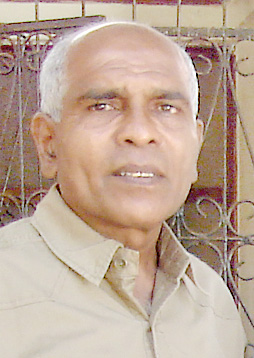News
From the pirates’ clutches into the arms of loved ones
View(s):After over a year of torture and starvation in hell on earth Sarath Surasena makes it to paradise a broken man
By Ranee Mohamed
Sri Lankan Engineer Sarath Surasena was the only Lankan in the crew of 19 on the ship M/V Orna, which was captured by Somali pirates in December 2010. After over 365 days and nights of terror, torture and anguish, both at mid sea and in the Somali desert, Mr. Surasena returned to Sri Lanka on January 13.

Sarath Surasena: Back home after suffering immense hardship
“I cannot explain the happenings,” said Mr. Surasena, sipping freshly-brewed Sri Lankan tea at his home in Kalutara.
He pauses to cough and his red-rimmed eyes begin to tear. There are telltale signs of a life of suffering; the scars of torture at the hands of the pirates are fading from his body: but seemed to remain fresh in his mind.
“I am depressed, I am sick and I don’t know what has happened to my kidneys,” says this engineer who now finds the joints in his body almost creaking.
But when Mr. Surasena left Sri Lanka to pursue his profession on the high seas, he had been in the pink of health.
“It all started when we were on our way from Durban to Okaha, India. Our ship was carrying 35,000 tonnes of Anthracite coal, and we had sailed for about three days. We were warned by the Pirates Information Centre to sail 500 miles away from the Somalian coast. However, wanting to be extra safe, we sailed 900 miles away,” said Mr. Surasena.
But, on that day in December, when he had been called into the engine room, pirates had been the last people on his mind which was occupied with thoughts of his sons, 14-year-old daughter and his wife.The scene shifted as fast as the gushing waves, as Mr. Surasena climbed up and looked through the peephole and saw to his horror, two boats – one on starboard and the other on the port side of the ship. “They were carrying guns and grenades,” he said. The fear of death descended like darkness on the crew.
“There were RPGs, guns and ammunition of all sorts,” recalled Mr. Surasena. “Soon, the pirates threw ropes and climbed onto the ship. They were dark, in tattered clothes, nothing like the pirates you see in films, they were ugly,” said Mr. Surasena.
“The first thing they did was to disable the communication systems – the GPS and Automatic Identification System (AIS). Then they examined our cabins, took our mobile phones and grouped us, assigning pirate guards for each group,” he said.
Mr. Surasena and his crew soon learnt that the pirates were using an Iranian fishing craft as their mother ship. Then, they had begun to use M/V Orna and its crew for their activities.
Taken to Rasawath, Somalia, the pirates had invited a negotiator. “His name was Ahamed and he spoke English. They made us give telephone calls to our families to get them to ‘press’ the ship’s owner to pay the ransom,” said Mr. Surasena.
The pirates had demanded a ransom of US$ 100,000 for the release of M/V Orna and her crew.
“Our ship owner was angry that his property has been hijacked, and refused to pay. But later, he negotiated and agreed to pay US$ 30,000,” said Mr. Surasena. The pirates enjoyed the food on their ship. But when the food ran out, Mr. Surasena and the Syrian crew were thereafter taken to the desert.
There was no talk of the ransom demanded, and the pirates were getting angry. “On some days we were given a litre of water for our needs, while on other days we got three litres, and on some days we did not get any water at all. The water was given to us in cans used to carry diesel; so the water we drank tasted of diesel. It made no difference, because the water was murky and there were insects floating in it. I was dreaming of red rice and curry, and drinking brown coloured water.”
“We were starved and tortured. The pirates would remove all our clothes and hit us with sticks covered with thorns and kick us. They would tie us up with thick rope, almost stopping our blood circulating. We could not move after the ropes were removed. The nights were cold and the days were scorching hot. We were made to stare into the glare for hours,” said Mr. Surasena, who had no way to monitor his blood pressure and no heart medication during this time.
The wait had been long and there had been some infighting among the pirates. Mr. Surasena and three others in his group had pleaded and haggled with the pirates around them and paid money into a bank account via telephone calls – US$ 10,000 per person as ‘travelling costs– for a night of travel through the jungle to Mogadishu.
Mr. Surasena was met by a representative of the UN; helped by the consular general in Nairobi and today lies -lulled by his motherland and consoled by his loved ones.
Follow @timesonlinelk
comments powered by Disqus















